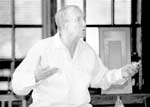Poet lives his words

Yevgeny Yevtushenko, a Russian poet, spoke and recited some of his famous works on Sept. 30.
Before the audience even heard a word, Russian poet Yevgeny Yevtushenko was given a standing ovation.
The audience looked on as Yevtushenko performed his work. Under his thick, Siberian accent, the words flowed from his lips as his hands and body floated across the stage.
Accompanied by a pianist, two students from the theatre department and a vocalist, Yevtushenko performed his work as if in a play or musical on Sept. 30 in Webster Hall auditorium.
On Sept. 15, a London-based newspaper, The Guardian, was the first to print Yevtushenko’s poem, School in Beslan, just days after he had written and translated it into English. He said his reasoning was that he received several calls expressing condolences on what has recently happened with Chechen terrorists.
He explained he thinks the Chechens are doing what they are doing because of what past Soviets did to them.
“Then Yeltzin’s plebeian arrogance and the blitz-kriegian boasting of his generals pushed Chechens to the first explosions,” he said. “When cattle-cars by Stalin’s order were going to Kazakhstan, stuffed with heaps of Chechens, lying on each other, a future terror was born there.”
He revealed to everyone how he felt the pain and terror those must have felt on that day.
“I am together with the charred children,” he said. “I am one of them. I, too, am from the school of Beslan.”
His voice got louder and louder, he shouted and pointed.
“How the face of the sky changes, when the darkness roared with tanks in Beslan, and with a premonition of the end in that school, in that basketball hoop trembled explosives, hung by Stalin,” he said.
His voice thundered across the auditorium at times. However, he was quiet and playful when speaking of love or childhood.
Some critics say he was a master at defying Stalinism and the Soviet era. He wrote what people could not say due to fear of repercussions. Yevtushenko mastered the art of poetry and all of its meanings.
Yevtushenko teaches poetry at Queens College in New York and the University of Tulsa. He was elected honorary member of the American Academy of Arts and Letters and Member of the European Academy of Arts and Sciences.
He was awarded the highest medal of Russia “For the Great Achievements for the Motherland” for his literary works.
He has published more than 40 books, and his work has been translated into 72 languages.
Your donation will support the student journalists of Missouri Southern State University. Your contribution will allow us to purchase equipment and cover our annual website hosting costs.















